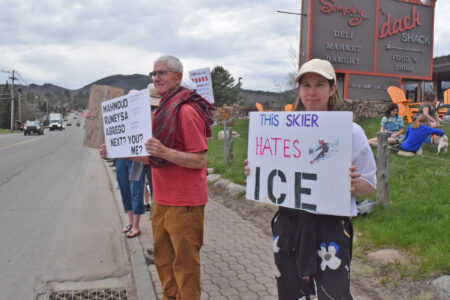COVID-19, domestic violence and consensus discussed on Cobb call-in

Congressional candidate Tedra Cobb talks with Lionel Lemery of Queensbury during an event in January at the Crandall Public Library in Glens Falls. (Provided photo — Michael Goot, The Post-Star)
North Country Democratic congressional candidate Tedra Cobb held a Zoom town hall with supporters Wednesday, discussing COVID-19, domestic violence and building consensus among moderate and progressive Democrats, as well as with Republicans.
Cobb focused on presenting herself as, in her words, “not a politician.” She said she believes she can lead this district well because she has been through many of the same struggles and situations as many people living here.
She said she’s started businesses, struggled with money, had three jobs simultaneously and dealt with health care issues in her family.
–
COVID-19
–
Cobb said federal money needs to “flow” for the North Country to get through the COVID-19 pandemic. She said that after the 2008 recession the North Country took longer than other areas to recover.
She said federal virus-related unemployment benefits of $600 a week, on top of state unemployment aid, need to continue for those who have been laid off or furloughed during the pandemic, or for whom it may be dangerous to return.
“How many of you have heard people say, ‘I want to go back to work’?” Cobb said. “This is a very hard-working district. So when I hear people say, ‘People don’t want to go back to work,’ that is absolutely false.”
Cobb said there has not been a satisfactory federal response to the pandemic yet. She said the virus has been politicized, which she called the “root of chaos at the federal level.”
“We’re not seeing a consistent or fair or science-based federal response,” Cobb said. “There are 157,000 people who are dead. We are not listening to science.”
She said the federal government needs to assist states by funding more personal protective equipment and testing.
Another voter asked about mail voting, and brought up concerns about Postmaster General Louis DeJoy, who recently admitted to creating rules that delay the mail.
“The new postmaster general is cutting overtime and establishing new guidelines to slow down the mail,” Cyd Groff of Granville said. “How do you think that is going to impact … my vote by mail?”
Cobb said any stimulus package must include post office funding to help make voting by mail more efficient.
–
Consensus
–
A participant on Facebook, who was not named, asked how Cobb plans to bring together moderate and progressive Democrats in the election. Cobb said she wants to expand her reach to the GOP, too.
She said they may not always agree on the path but can always find common ground on issues.
“This district … we are fiercely independent,” Cobb said.
She said she believes partisan fighting and a lack of compromise drives voters away.
Cobb also made a big promise.
“I will never cut a dime from Social Security and Medicare,” she said.
–
Domestic violence
–
One voter, Jill Nadolski, spoke of domestic violence and asked Cobb what she would do about the issue if elected.
“With the pandemic there has been an uptick in people who are suffering from domestic violence,” Nadolski said. “I’m a survivor of domestic violence.”
She mentioned that Stefanik voted against the Violence Against Women Act.
“It’s not just about having women in office; it’s about having women who are going to be advocates for women,” Cobb said.
Stefanik’s involvement with VAWA is complicated.
VAWA focuses on educating police about domestic violence, funding community victim services and prevention programs, and eliminating a nationwide backlog of untested rape kits. In 2019 Stefanik voted against the Democratic version of the act while urging the House to pass a Republican version. The Democratic version passed the House, with 33 other Republicans voting for it, but has been stalled in the Republican-majority Senate ever since.
Stefanik predicted this and last year asked the House to pass the Republican version, which she said was not “partisan” like she said the Democratic version was.
The major difference between the two was a measure the Democrats included to close the “boyfriend loophole,” would extend existing gun restrictions prohibiting firearm purchases for people who are “married to, lived with, or have a child with (a) victim” and who have been convicted of an abuse felony or are under a restraining order, to include current and former dating partners convicted of abuse or stalking charges.
Because of this gun restriction, the legislation has not passed the Republican-majority Senate. When the bill is stalled, the laws stay on the books, but funding is not renewed.
In an impassioned speech on the House floor in 2019, Stefanik said that voting “no” on the Republican proposal is voting against VAWA. She said the Democratic bill would “collect dust in the Senate.”
It did, and in December 2019 a Houston police officer was killed while on duty by an abusive boyfriend with a firearm, garnering fierce condemnation of Senate Republicans from the police chief.
Stefanik’s version would have extended VAWA until 2020 so a “clean” version with no amendments could be worked out.
Democrats criticized this legislation at the time, saying it did not include provisions for child abuse training and testing of rape kits.




